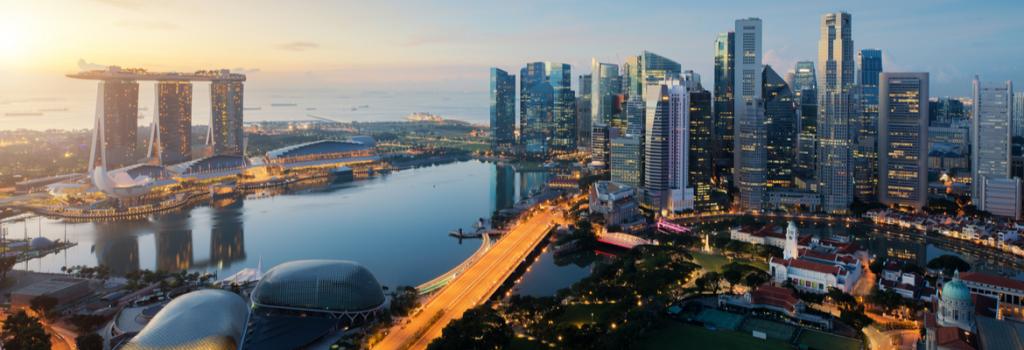
At once sophisticated, sumptuous and smart, Singapore is a future facing multi-cultural hub that connects Asia to the world. Consisting of 63 islands, it boasts a booming economy and is popular with Australian citizens and companies alike.
Singapore is a city of high-rises and stunning architecture - most notably the Marina Bay Sands and ‘City in a Garden’ green skyscrapers. This modern business powerhouse is also a shopping and street food mecca that has something to tempt every business traveller. Transport is efficient, the streets are famously clean and with one of the world’s most impressive airports, it’s likely you’ll at least stopover in Singapore once (if not many times) in your business travels.
Singapore – the multicultural capital of Asia
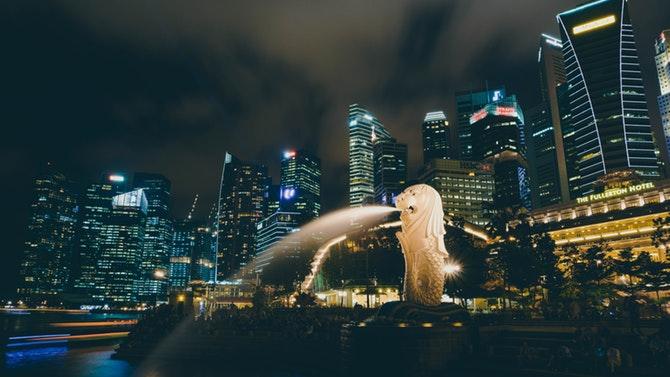
Singapore is home to a population of 5.6 million people, in an area that’s less than 6% of the size of the greater Sydney area. The people are predominantly from Chinese, Malay and Indian cultures, though business is usually conducted in English.
It also has a population of more than 1.32 million foreign nationals working in the city, primarily in technology and IT fields. The financial sectors are large contributors to the expat population in Singapore. A number of tech businesses are attracted to the country, thanks to high-speed internet and incentives provided by the government. Singapore is part of the Association of Southeast Asian Nations (11 countries) and once set up in Singapore, you’ll find it easy to expand your business throughout the ASEAN network.
Weather
Brace yourself for some humidity. With a location near the equator, Singapore has a typical tropical climate. You can expect abundant rainfall, high temperatures and high humidity. So, you can leave your winter weight business suit at home for this trip. Humidity can range throughout the day, from 90% in the morning to 60% in the mid-afternoon (only on days that it doesn’t rain). Prepare to sweat through your business outfit if you’re planning on spending any time outdoors. We suggest a hotel that’s nice and close to your meeting locations.
General and Business Culture
Business in Singapore generally keeps to international standards, though the range of languages, cultures, and the climate do impact how they do business. For example, dress code can be a little more relaxed since it’s so close to the equator and usually hot and humid all year round. Typically, smart business shirts and pants or skirts will suffice, you can leave the jacket or blazer in the wardrobe.
Here are some quick general facts to remember:
- In some offices and almost every private space, you’ll have to ditch your shoes at the door as is local custom.
- Tipping isn’t mandatory in Singapore but it is appreciated.
- For social events bring a bottle of wine as a token, or chocolates if your hosts abstain from alcohol (it’s a good idea to check first).
- It’s common to see physical contact between people of the same sex in business. You might see men holding hands or walking with their arms around each other.
- Negotiations are conducted at a slow pace and rely more on personal relationships than the company you’re likely representing. Finalising a business agreement could involve several trips.
Meetings
A simple handshake is sufficient as for a greeting for foreigners. You may find that different cultures within the country have different ways of greeting, but you’re not required to take part unless that is your heritage. Malays will great each other with a handshake and then a palm placed briefly over their own heart. This cultural greeting is only for those of Malay heritage.
As with most Asian countries, business cards are key in Singapore. Make sure you’re prepared as you’ll need to extend one for almost every first meeting. Offer the card with both hands, with the letters facing the recipient. Receive with two hands and take a moment to view it briefly, then leave it on the table face-up during the meeting. Do not leave the card behind though, as this could be seen as disrespectful.
When talking with business contacts there are topics that are safe, and some to avoid:
| Topic to discuss | Topics to avoid |
|---|---|
| Travel and the Arts | Personal life |
| Economic advances and architecture of Singapore | Bureaucracy |
| Food and Cuisine | Politics |
| Future plans or business success (without boasting) | Religion |
Common faux pas
To help you navigate the varied culture of Singapore, here is a list of common faux pas to avoid.
- Complimenting someone’s appearance. This can come across as insincere. It is better to compliment their achievements.
- Running late. It is considered an insult to leave a Singaporean business executive waiting.
- Public disagreement. Avoid correcting or debating with an elder or superior as they will lose face, and you will lose the respect of others.
- Raising your voice or being overly emotional. This is not appropriate in Singapore. Speak in a low voice and calmly.
- Not introducing people by age/seniority first. The most important members of your group have to be introduced first.
- Responding too quickly. It’s common to mentally count to 10 before responding, to demonstrate you have put thought into your response.
- Touching someone’s head. The head is considered sacred by Indians and Malays, so don’t touch anyone’s head or face.
Laws
Singapore is known as “The Fine City” with two meanings. While the country is immaculate and well-kept, it also hands out a number of fines to anyone breaking the rules. Their laws extend beyond the norm to include fines for chewing gum, not flushing toilets and more. Here is a list of the top laws to keep an eye out for when visiting Singapore.
No chewing gum or spitting
Although we’d hope most business professionals are not in the habit of spitting, the chewing gum ban may be a little more difficult. Swap out that gum for mints if you’re worried about coffee breath. While you might be ok getting a small packet of gum through the airport, if you’re importing cartons you’ll definitely get pulled up by security.
Jaywalking and littering
These are the most common offences in Singapore. Jaywalking (crossing the road within 50 metres of a crossing zone) is dangerous for the pedestrian and the drivers on the road. You could receive a $20USD fine for your first offence, which skyrockets to $1000 for repeat offending or even jail time. Littering fines are similar where you can expect a $1000USD fine for dropping rubbish.
Smoking
Prohibited in all indoor places or anywhere that the public congregates – similar to Australian laws. Make sure you check with your local contacts if you can smoke somewhere before you light up.
LGBT
Same-sex activity is illegal in Singapore, with relationships not recognised by law and the adoption of children by same-sex couples considered illegal. No anti-discrimination protections exist for LGBT people. Exercise caution if you’re travelling to Singapore as a same-sex couple. Luckily Singaporeans avoid discussing personal lives in business, so you likely won’t have to answer any questions about your personal situation.
Urinating in Elevators
Yes, you read correctly. Singapore has had major issues in the past with urinating in elevators. Quite unusual for a country that values hygiene and cleanliness but here we are. Certain elevators across the country are fitted with UDDs (Urine Detection Devices) which set off an alarm if it detects urine, closes the elevator and calls the police.
Not Flushing the Toilet
Save yourself a $150USD fine and hit that flush button. Singapore values cleanliness and order. No one wants to have to flush someone else’s business, so they make sure to take care of their own. Although it’s a difficult law to police (as in they don’t have police stationed at every toilet), it’s just part of common courtesy.
Drugs
If any of the other laws seem trivial, this one is absolutely not. Drug possession, consumption, manufacturing, import, export, or trafficking in any amount is illegal. Singapore is one of the few countries that still have the death penalty (capital punishment) and actively use it. Depending on the quantity of drugs you’re caught with, you could face punishments from caning (yes with a cane), to life imprisonment or the death penalty. Nine people were executed in 2018 on drug-related offences. Under the Misuse of Drugs Act (Singapore), police can search locals and foreigners at any time without a warrant if they reasonably suspect you might be in possession of illegal substances.
Airports and Transfers
has one major airport, the airport to end all airports. Changi Airport is frequently named the Best Airport globally, and it won’t take you long to figure out why. With four terminals spread across 13 square kilometres of land (and a fifth terminal under construction), the size of the Changi Airport is amazing enough on its own.
A flight either arrives or departs Changi Airport every 80 seconds, with roughly 7,200 flights making their way through the airport each week. If you’re connecting to a different flight through Changi, there is a free Skytrain that connects Terminals 1, 2, and 3, and a free Shuttle Bus that connects Terminal 2 and 4.
Transport in Singapore
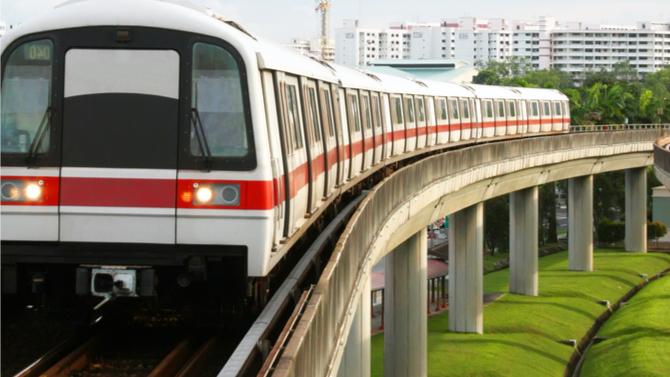
Thanks to Singapore’s world-class infrastructure you will have plenty of options to get around. Though it is important to note that Uber doesn’t operate in Singapore as of mid-2018, but you can use a range of local rideshare apps if you prefer it over taxis.
Taxi
Taxis can be found easily at cab ranks across the CBD or hailed easily from the street. In certain areas of the CBD hailed taxis may find it difficult to pull over, so ask your hotel where the nearest cab rank is to make your trip easier. Taxis are metered in Singapore and may include surcharges depending on when/where/and which taxi company you board. You can always ask your driver for a rough idea of the final fare when you first jump in.
Train
Singapore’s MRT (mass rapid transit) is a great way to get around the city, for business or leisure, as it connects to the major city attractions. You can purchase single tickets or a Singapore Tourist Pass card pre-stored with the number of days you’d like to travel. You can simply touch on and off with your pass, an affordable way to get around the city.
Bus
You can use your Singapore Tourist Pass on the bus as well or purchase one-off tickets (but you will need the exact change). It’s a great way to see more of the city if you have the time and the buses run regularly. It can be a little confusing as there isn’t one system which houses all of the bus timetables online, but you can purchase a bus guide from the newsagents for a few dollars. Given the complexity, it might be best to leave bus journeys for when you have leisure time.
Cars are an expensive status symbol in Singapore, with the government issuing a limited number of Certificates of Entitlement to allow people to own cars. A 0% growth formula was implemented in 2018 to ensure there wasn’t an increase in vehicles on the road.
Hotels in Singapore
Though boasting a small location, Singapore is rich with hotels and accommodation thanks to the beautiful skyscrapers across the country. Corporate Traveller works with over 100 accommodation providers within Singapore with great negotiated rates and add-ons. You can find out more from your dedicated Travel Manager, and in the meantime, here are three great options:
Conrad Centennial Singapore by Hilton
Looking for luxury? The Conrad Centennial Singapore by Hilton is a stunning luxury hotel minutes away from Marina Bay with easy access to the area’s top attractions and on-site restaurants and lounges. If you have a client to impress, this is somewhere you want to bring them. With a beautiful contemporary design that exudes class, it is a definite for executive business trips.
Grand Mercure Singapore Roxy
If you’re after a place to entertain, then the Grand Mercure Singapore Roxy is a must for your list. Only 15 minutes from Changi Airport and Marina Bay Cruise Centre, it is located in historical Katong, a heritage suburb east of the city. It’s a short walk from East Coast Park, and close to everything business travellers need. Host meetings and events in their function rooms to impress your guests.
Ibis Singapore on Bencoolen Hotel
If you’re looking for something a little lighter on the company credit card, Ibis Singapore on Bencoolen Hotel provides great rooms and amenities at an affordable price. Located a few minutes from Marina Bay, you have plenty of key destinations and entertainment precincts at your fingertips.
Dining
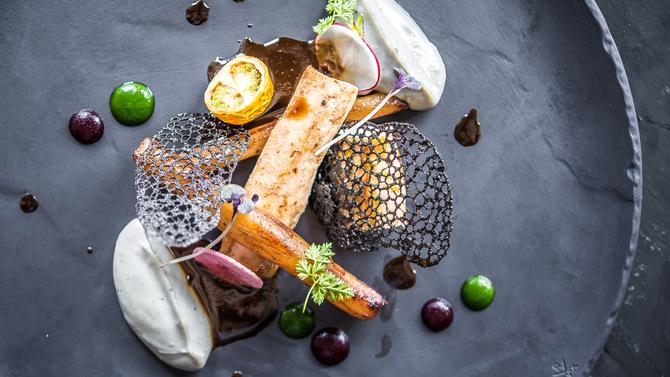
With a blend of cultures and 5.6 million people to feed, there are a tonne of options for dining. There are simply too many to list, and too many fantastic picks to narrow them down to a top few. We’ve profiled some of Singapore’s top restaurants below for client entertaining, and you can find many more via TripAdvisor.
The Tippling Club
Located in Singapore’s Chinatown, the Tippling Club is ranked as one of the best restaurants in the country and across Asia. With unusual food combinations and a stellar cocktail menu, this is the place to bring clients when you want to impress. You may want to keep the guest list small though as this can be quite the pricey restaurant. It all depends on the size of the contract you’re trying to win or retain at the end of the day.
Waku Ghin
Waku Ghin near Marina Bay is the artwork of celebrity chef Tetsuya Wakuda. The restaurant is designed so diners can move from room to room throughout their meal. Take in the floor-to-ceiling views of Singapore’s landscape and be prepared for an experience like no other.
Les Amis
French-Asian fusion anyone? The stunning Les Amis in Orchard, Singapore has a feel of old-school elegance when you walk through the doors. It takes a new approach to traditional French cuisine with a touch of Asian aesthetics. The wine cellar stocks over 2,000 labels and is one of the largest in Asia.
Looking for a quick bite to eat? Don’t forget to hit the pavement and enjoy some of Singapore’s best local food with street vendors everywhere (particularly Chinatown).
Tourist Time
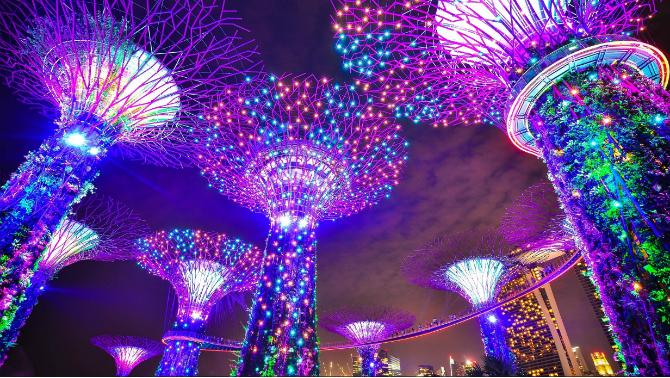
If you’re lucky enough to get a spare few hours, a day or weekend during your trip to Singapore, there is no end to the list of exciting things to do. Here are a select few that you have to experience at least once in your lifetime.
Gardens by the Bay
You’ve likely seen pictures of Gardens by the Bay on the internet and not even known it. The famous supertree structures that are illuminated at night are well loved by travellers and feature heavily on Instagram. Gardens by the Bay is Singapore’s latest green space, a huge colourful and futuristic park right by the Marina Bay. Great fun for both kids and adults, you can access most of the park for free or have full access for a fee. Definitely a bucket-list item, the main part is open until 9pm.
Chinatown
If heritage and history is more your thing, then head to Singapore’s Chinatown for a beautiful blend of culture and food. With historic temples and traditional medicinal halls sitting amongst new bars and restaurants, it’s the place where the old world and the new come together. Visit temples for culture or Chinatown’s Food Street for amazing cuisine. You could spend hours getting lost in this sea of Chinese culture.
Singapore Night Safari
Are animals your passion? Wildlife Reserves Singapore runs the Night Safari, the world’s first safari park for nocturnal animals. You can go on a safari with a guide, join feeding sessions, or get up close to the animals on a walking trail. Don’t miss the popular Leopard Trail, featuring the largest collection of wildlife indigenous to Southeast Asia.
Co-working spaces
In such an innovative city with high levels of expat business visitors, it is no wonder Singapore has many co-working spaces. Chic offices are standard, you won’t find any drab looking spaces to work in – you’ll be forgiven for thinking you’ve walked into a Google office. Here are three co-working spaces we love, and you can check out more of them at SG Magazine.
Camelia & Co
If you have an eye for soft pastels, pine wood, and marble, then level 1 of this co-working space could be for you. Camelia & Co boasts three levels with a different vibe for each. Whether you need an office suite, dedicated desks, hot desks, private offices, or private booths – Camelia & Co has something to suit. The space offers wifi, pantry, a laptop friendly workspace, and flexible booking options. Visit Camelia & Co’s website to find out more.
The Co.
If you have your eyes on the future, then this futuristic workspace might be perfect for you. The Co. is one of Southeast Asia’s fastest-growing entrepreneurial communities. It has two locations in Singapore, High Street and Duxton. High Street boasts the more futuristic vibe, while Duxton gets back to nature with leafy greens that suits the charming neighbourhood. Visit The Co.’s website for more.
WeWork
WeWork has 11 locations across Singapore, so you’re bound to find something that fits your location and budgetary needs. You have options to select from private offices, dedicated desks, or hot desks. All locations have onsite staff, fully-stocked printing stations, fast internet, private phone booths and more.
Visit WeWork’s website to find the co-working space for your business.
Visit ‘The Fine City’ of Singapore
Whether you’re headed for a business meeting or looking to set up shop in Singapore, it’s a beautiful country worth exploring. If you’re looking for support and further insights for booking your trip, talk to your dedicated Corporate Traveller Travel Manager today. Just remember to leave the blazer at home, pack a hand-held fan, and brace yourself for humidity.